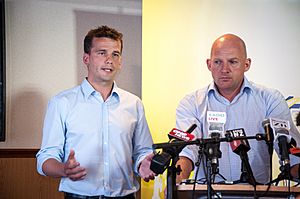David Seymour facts for kids
Quick facts for kids
David Seymour
MP
|
|
|---|---|
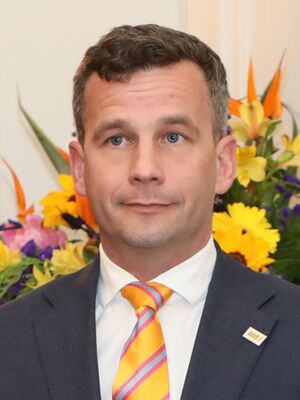
Seymour in 2023
|
|
| 21st Deputy Prime Minister of New Zealand | |
| Assumed office 31 May 2025 |
|
| Prime Minister | Christopher Luxon |
| Governor-General | Cindy Kiro |
| Preceded by | Winston Peters |
| 1st Minister for Regulation | |
| Assumed office 27 November 2023 |
|
| Prime Minister | Christopher Luxon |
| Preceded by | Office established |
| 7th Leader of ACT New Zealand | |
| Assumed office 3 October 2014 |
|
| Deputy |
|
| Preceded by | Jamie Whyte |
| Member of the New Zealand Parliament for Epsom |
|
| Assumed office 20 September 2014 |
|
| Preceded by | John Banks |
| Majority | 8,142 (20.29%) |
| Personal details | |
| Born |
David Breen Seymour
24 June 1983 Palmerston North, New Zealand |
| Political party | ACT |
| Domestic partner | Alexandra Vincent Martelli (since 2022, engaged in 2025) |
| Alma mater | University of Auckland (BA/BE) |
| Occupation | Politician |
| Signature |  |
| Website | Official website: https://www.davidseymour.org.nz/ |
| Seymour's voice on interview with The Platform | |
David Breen Seymour (born 24 June 1983) is a New Zealand politician. He has been the 21st deputy prime minister of New Zealand since May 2025. He has also been the first minister for regulation since 2023.
Mr. Seymour is a member of the ACT Party. He has been its leader and a Member of Parliament (MP) for Epsom since 2014.
He grew up in Whangārei. He joined the ACT Party while studying at the University of Auckland. After graduating in 2006, he worked in engineering. He also worked for research groups in Canada before returning to New Zealand. He tried to get elected to Parliament in 2005 and 2011 but was not successful.
He entered the House of Representatives in 2014. He was ACT's only MP at the time. After this, he became the party leader.
Mr. Seymour was re-elected in 2017. He was still ACT's only MP. In 2020, he led ACT to a very good election result. The party won ten seats in Parliament. He also kept his Epsom seat. In the 2023 general election, Mr. Seymour was re-elected. The ACT Party won 11 seats, which was their best result ever. They also won an extra seat in Tāmaki.
After the 2023 election, ACT formed a coalition government. They joined with the National and New Zealand First parties. In this agreement, the role of deputy prime minister was shared. Winston Peters served first, and Mr. Seymour took over the role on 31 May 2025.
Mr. Seymour's ideas on the principles of the Treaty of Waitangi have caused a lot of discussion. During the 2023 election, he and the ACT party wanted a new law called the Treaty Principles Bill. They also wanted a referendum on these principles. ACT suggested changing the principles. They wanted to remove any mention of "partnership" between the Crown and Māori. Instead, they wanted to refer to "all New Zealanders." The bill was supported by National and New Zealand First to go through the first steps in Parliament. However, the bill was voted down on 10 April 2025. All ACT MPs voted for the bill, but it did not pass.
Contents
Early Life and Career
Mr. Seymour was born in Palmerston North on 24 June 1983. His family moved to Whangārei when he was a child. His family has Māori ancestors through his mother's side. His great-great-great-grandmother, Maraea Te Inutoto, was from Waimate North. She was part of the Ngāti Rehia hapū (sub-tribe) of Ngāpuhi. His family found out about their Māori ancestry when he was seven years old.
Mr. Seymour went to Auckland Grammar School. Then he studied at the University of Auckland. He graduated in 2006 with degrees in Engineering and Philosophy. After university, he worked in engineering. In the 2000s, he also worked as a policy analyst for research groups in Canada for five years.
Early Political Steps
| New Zealand Parliament | ||||
| Years | Term | Electorate | List | Party |
| 2014–2017 | 51st | Epsom | none | ACT |
| 2017–2020 | 52nd | Epsom | 1 | ACT |
| 2020–2023 | 53rd | Epsom | 1 | ACT |
| 2023–present | 54th | Epsom | 1 | ACT
|
Joining ACT and Running for Office
Mr. Seymour has been a member of ACT for a long time. He first joined the party through a student group called ACT on Campus while at Auckland University. He became the leader of this student group.
He ran in three elections before he was finally elected in 2014. His first attempt was in 2005 in Mt Albert. He was not successful. The seat was held by Helen Clark, who was the Prime Minister then. In 2008, while living in Canada, he ran again but was not elected.
In the 2011 general election, Mr. Seymour ran in the Auckland Central area. However, the seat was won by National's Nikki Kaye. ACT did not win enough votes to get more MPs into Parliament. Only John Banks, who held the Epsom seat, was elected for ACT.
Becoming Party Leader
After the 2011 election, Mr. Seymour worked as an adviser for John Banks. Mr. Banks was an Associate Minister of Education. Mr. Seymour helped create laws for Partnership Schools.
In 2013, John Banks resigned from his roles. In June 2014, he announced he would leave the ACT Party leadership. He also said he would not run for the Epsom seat again.
In February 2014, Mr. Seymour was chosen to run for ACT in Epsom. This area was important for ACT. Political experts said choosing Mr. Seymour was a "fresh start" for the party. He was the first person confirmed to run for Epsom. During his campaign, he was seen as "the star of the night" at a public meeting. People described him as "intelligent, witty and articulate."
During the 2014 election, Mr. Seymour released a campaign video online. The ACT Party said it became "viral" with about 35,000 views. Mr. Seymour said the video was "totally real" and showed him "just being me." Prime Minister John Key supported Mr. Seymour for the Epsom seat.
In Government (2014–2017)
First Term as MP
In the 2014 election, Mr. Seymour was elected for the Epsom area. He won by 4,250 votes. The previous leader, Jamie Whyte, did not win his seat. So, Mr. Seymour became the leader of ACT on 3 October 2014.
Government Roles
The National party formed a government in 2014. ACT supported them. Mr. Seymour was appointed as a parliamentary under-secretary. This meant he helped the Minister of Education and the Minister of Regulatory Reform. He was responsible for partnership schools. He also worked on changes to laws like the Resource Management Act 1991.
In 2015, a bill was proposed to make parliamentary under-secretaries subject to the Official Information Act. This law allows people to ask for information from the government. Mr. Seymour felt the bill was a personal attack. He said under-secretaries did not make decisions, so it was not needed. However, he voted for the law in June 2016.
Contracts for the second group of charter schools were finished in September 2014. In January 2016, a contract for a Northland charter school was ended. Mr. Seymour continued to support these schools. He pushed for more of them to be started.
Alcohol Sales Law
In August 2015, Mr. Seymour introduced a bill. It allowed bars and rugby clubs to stay open longer. This was for televising games from the Rugby World Cup. Many games started very early in New Zealand due to time differences. Normally, alcohol could not be sold then. Despite some opposition, Mr. Seymour's bill passed. This meant bars and clubs could open for Rugby World Cup games.
LGBTI Cross-Party Group
In 2015, Mr. Seymour joined a group of MPs from different parties. This group was started by Jan Logie. Its goal was to support LGBTI rights. Other members included Chris Bishop and Louisa Wall.
Legalising Ride-Sharing
On 4 August 2017, Mr. Seymour worked with Transport Minister Simon Bridges. They helped make Uber a legal part of New Zealand's transport system. This also allowed other ride-sharing apps like DiDi and Ola to operate in the country.
In Opposition (2017–2023)
Second Term as MP
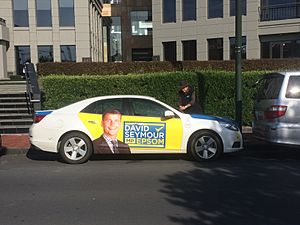
Mr. Seymour was re-elected to Parliament for Epsom in the 2017 general election. He was still the only ACT Member of Parliament.
Gun Control
Mr. Seymour was the only MP to vote against a new gun control law. This law banned semi-automatic firearms used in the Christchurch mosque shootings in March 2019. He criticised how quickly the government passed the law.
Zero Carbon Act 2019
Mr. Seymour had said the ACT party would vote against the Climate Change Response (Zero Carbon) Amendment Act. However, he was not present for the final vote on the bill. This meant the bill passed with everyone else voting for it. This drew attention from the media.
COVID-19 Pandemic (2020)
During the COVID-19 pandemic in New Zealand, Mr. Seymour was part of the Epidemic Response Committee. This committee helped manage the country's response to the pandemic.
Third Term as MP
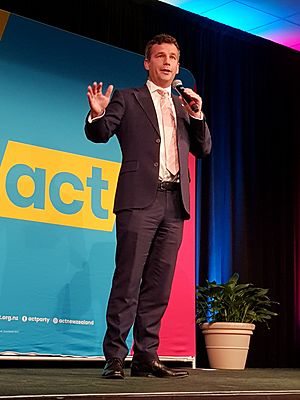
During the 2020 New Zealand general election, Mr. Seymour was re-elected for Epsom. He won by a large number of votes. The ACT party also won eight percent of the total votes. This gave them ten seats in Parliament. In the larger group of ACT MPs, Mr. Seymour was the spokesperson for Finance and COVID-19 Response. He remained the leader of the ACT party.
Mr. Seymour's third bill to be debated was the Regulatory Standards Bill. It aimed for stricter rules on how the government makes regulations. However, it did not pass its first vote in July 2021. After this, Mr. Seymour announced his next bill. It would create a framework for Parliament to have four-year terms instead of three.
COVID-19 Pandemic Response
After the Delta variant outbreak in August 2021, Mr. Seymour released ACT's COVID strategy. He suggested changing the government's plan. Instead of trying to eliminate the virus, he wanted to focus on reducing harm. This meant isolating sick people and making it easier for travellers from low-risk countries to enter. In November 2021, he suggested regular testing for unvaccinated workers. He preferred this over the government's rule that some workers had to be vaccinated.
In December 2021, Mr. Seymour opposed checkpoints set up by Police and Māori iwi (tribes). These checkpoints screened travellers going into the Northland region. He argued they would limit people's freedom to move. Other politicians also criticised these checkpoints. In response, Labour's deputy leader, Kelvin Davis, said the criticism was due to anti-Māori racism.
2022 Incident
In December 2022, Mr. Seymour questioned Prime Minister Jacinda Ardern in Parliament. After she answered, Ms. Ardern was recorded calling Mr. Seymour an "arrogant prick." This comment was recorded and aired on television. Ms. Ardern later apologised to Mr. Seymour. The two politicians later worked together to raise money for the Prostate Cancer Foundation. They auctioned a signed copy of the Prime Minister's remark. They raised NZ$60,000.
In Government (2023–Present)
Fourth Term as MP
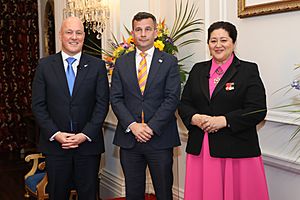
In the 2023 New Zealand general election on 14 October, Mr. Seymour was re-elected in Epsom. He won by 8,142 votes. ACT won 8.64 percent of the total votes. This gave them 11 seats in Parliament. After the election, ACT joined talks with the National and New Zealand First parties. They formed a new government.
On 24 November, the three parties agreed on policies and ministerial roles. Mr. Seymour felt ACT had a good deal. He said the Government would announce a 100-day plan. This plan might include removing some laws passed by the previous Labour government.
As part of the agreement, Mr. Seymour shares the role of deputy prime minister. Winston Peters served first until 31 May 2025. Mr. Seymour then took over the role. He is also the first minister for regulation, a role he suggested. He was also appointed as an associate minister for education (for partnership schools), finance, and health (for Pharmac).
Associate Education Minister
In March 2024, Mr. Seymour, as Associate Minister of Education, said the $350 million government-funded school lunch programme "Ka Ora, Ka Ako" would be reviewed. He said there was no proof that the programme improved school achievement or attendance. He mentioned a 2023 report that found 12 percent of lunches were wasted. He also suggested fining parents for truancy (not sending children to school). The school lunch programme serves 220,000 students. Some school leaders defended the programme. They said stopping it would increase truancy.
On 14 March 2024, Mr. Seymour visited Freyberg High School in Palmerston North. He met with staff to discuss truancy. During his visit, some students performed the haka (a traditional Māori posture dance). This was to protest against cutting the school lunch programme. They also protested against policies they saw as anti-Māori. One student spat near Mr. Seymour. The principal said the students' behaviour was "totally unacceptable." Mr. Seymour said some students did not respect tikanga Māori (Māori cultural values). He also said students were being affected by "information that isn't quite true." The school later decided not to discipline the students. Instead, they would work with the local iwi (tribe) to address the incident.
In April 2024, Mr. Seymour created a board to help bring back charter schools. The board aims to re-establish these schools by 2025. On 16 April, Mr. Seymour announced changes to early childhood education. These included making teaching qualification rules easier. He also said the government would decide where early childhood centres could be located. Mandatory reporting of child abuse was also introduced.
On 1 May 2024, Mr. Seymour confirmed the government would continue funding the free school lunches programme for a few years. This would happen until a review was finished. On 8 May, he announced a changed school lunch programme. It would cost $234.8 million for the 2025 school year. Under the new plan, 10,000 pre-schoolers in low-income centres would get free morning tea and lunch. The programme for primary school students would stay the same in 2025. For older students, meals would be bought in bulk by the government and delivered to schools.
On 14 May, Mr. Seymour announced $153 million from the 2024 budget. This money would convert 35 state schools into charter schools. It would also create 15 new charter schools between 2025 and 2026. Some groups opposed these plans. They said charter schools were "profit-driven" and would take money from state schools. They also worried about disadvantaged children. Others welcomed the return of charter schools. They argued it would help children and make the education system more flexible.
In September 2024, Mr. Seymour confirmed the government would prosecute parents for repeated truancy. They would also remove "teacher-only days" during school terms. However, Education Minister Erica Stanford later reversed this. She confirmed four teacher-only days for 2025.
In October 2024, Mr. Seymour shared details of the new free school lunch programme. It would start in early 2025. He said it would save $130 million a year. Meals would cost about NZ$3 each. Meals would include dishes like chicken katsu and lasagne. Meals for younger students would be about 240 grams. Meals for older students would be at least 300 grams. Schools would get money to prepare meals themselves or use outside suppliers.
On 19 December 2024, Mr. Seymour announced changes to the Education and Training Act 2020. These changes would strengthen universities' free speech rules.
In April 2025, Mr. Seymour wrote to local council mayors. He asked them to help reduce truancy and increase school attendance. Some mayors felt this was unfair. They said the government had told local councils to focus on basic services like roads and water.
Associate Finance Minister
On 10 March 2024, Mr. Seymour announced a change in tax rules. The government would bring back interest deductions for residential investment properties.
Associate Health Minister (Pharmac)
In July 2024, Mr. Seymour, as Associate Health Minister, gave instructions to Pharmac. Pharmac is the agency that buys medicines. He told them to stop considering the Treaty of Waitangi in their decisions. He wrote that Pharmac should focus on improving health for all New Zealanders based on their actual needs. This instruction was supported by Pharmac's board chair. However, a former Māori Health Authority leader criticised it. He said the government could do more to improve Māori access to health services.
Acting Prime Minister
Mr. Seymour was the Acting Prime Minister from 14 to 20 July 2024. This was while Prime Minister Luxon was on leave. Deputy Prime Minister Winston Peters was also away. As acting prime minister, Mr. Seymour visited a Military-Style Academy Pilot for young offenders.
Regulation Role
As Minister for Regulation, Mr. Seymour is in charge of the proposed Regulatory Standards Bill. He says its purpose is to make lawmaking more open. He believes the bill will protect individual and property rights. It will also help businesses grow. Some experts have criticised the bill. They say it might limit scrutiny and put property rights above other important things. Others argue that good laws are needed to protect personal freedom and property.
Personal Life
Mr. Seymour appeared on the TV show Dancing with the Stars. He competed to raise money for Kidsline. This is a phone counselling service for young people. He finished 5th in the competition.
In a 2021 interview, Mr. Seymour said he would like to start a family. He said he would "give up politics in a heartbeat" for it. In November 2024, he announced he had been dating Alexandra Martelli for two years. She is an Auckland property buyer. They became engaged in 2025.
Electoral History
2005 Election
Mount Albert (New Zealand electorate)
2011 Election
Auckland Central (New Zealand electorate)
2014 Election
Epsom (New Zealand electorate)
2017 Election
Epsom (New Zealand electorate)
2020 Election
Epsom (New Zealand electorate)
2023 Election
Epsom (New Zealand electorate)
 | Bayard Rustin |
 | Jeannette Carter |
 | Jeremiah A. Brown |


